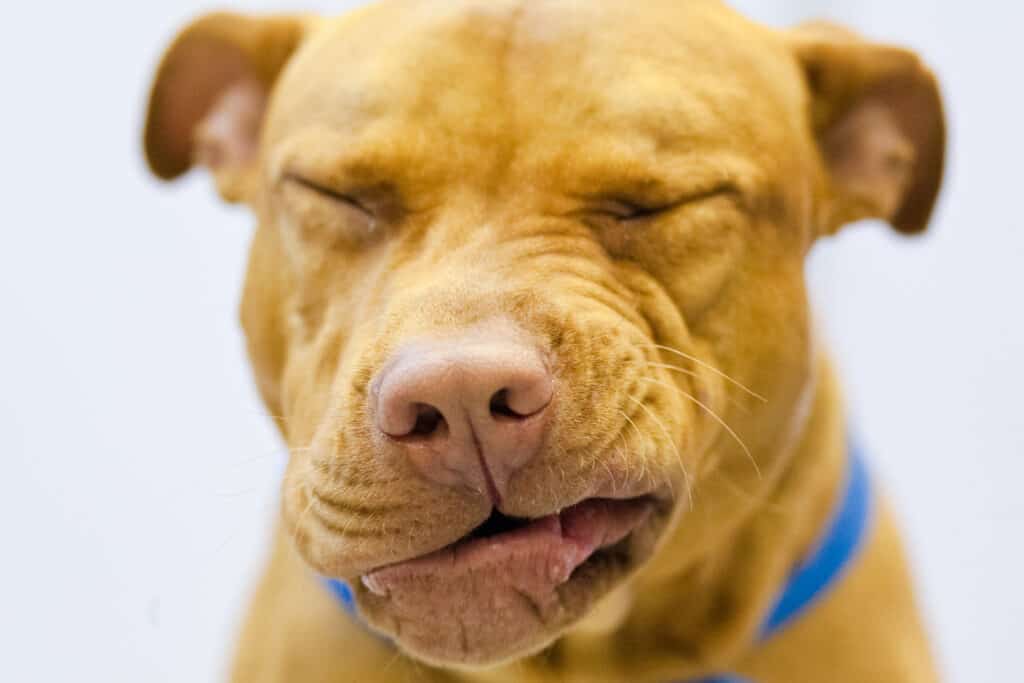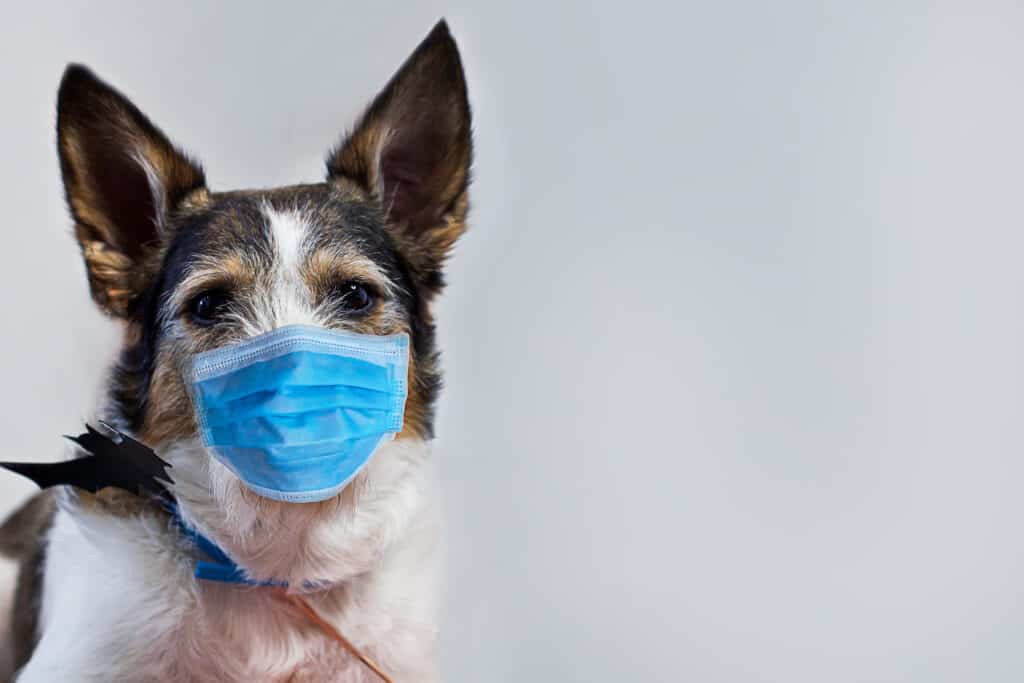There has been a rising concern amongst dog owners that their dog could be a carrier for the new COVID-19 variant, Omicron which is believed to be more dangerous than other variants according to a study done by Spanish researchers.
This has led dog owners to be more fearful of potentially giving the virus to their dogs, or their dogs spreading the virus to them. Although it is possible for animals to be infected with the virus, it is important to understand that the virus affects both animals and humans differently.
If you are concerned that your dog could be a potential carrier of COVID-19, we will give you the answers you need.
Can Dogs Get Coronavirus?
Before we get into whether dogs can spread the Omicron variant, it is important to understand how the virus works in animals.
It is possible for dogs to get COVID-19 according to researchers. A total of 50 dogs, 28 cats, and one rabbit were tested for COVID-19 between December and March and a tenth of the pets tested positive for the virus, but they did not show any symptoms. However, the study found that it was less likely for the Omicron virus to be spread from pets than the Delta or Alpha variants.
Since the Omicron variant can easily be spread by humans over other variants, researchers suspect that it can be spread through our household pets, such as dogs although it is very rare.
Doctors Sarah Hamer and Lori Teller who are associate professors at the Texas A&M College of Veterinary Medicine and Biomedical Sciences have given insight as the whether they believe dogs and other animals can spread the virus to their owners.
Dr. Hamer’s research team was the first to discover whether the Alpha variant of the virus can be present in our pets. The dogs who were believed to be infected with the virus showed mild symptoms such as sneezing which was resolved quickly and the virus itself is not much of a concern for our dogs as it is for humans.

Since the Omicron variant can easily be spread by
humans
over other variants, researchers suspect that it can be spread through our household pets, such as dogs although it is very rare.
©memorable9/Shutterstock.com
How Do You Know If Your Dog Has COVID?
Dr. Hamer said that pets affected with COVID-19 typically show signs of having a mild upper respiratory infection, but it is also possible for our pets to not show any symptoms, but they can still carry the virus and test positive for COVID-19.
Dr. Teller says that avoiding all contact with your pet while you are in self-isolation and are infected with the virus can be difficult for many owners as they are a source of comfort for us when we are sick. Dr. Teller advises us to talk with a veterinarian about precautions we can take to prevent spreading the virus.
This can also be a way to keep your dog safe from being affected and keeping yourself safe if your dog is showing symptoms of the virus which can be tested by a veterinarian.
According to the Center for Disease Control and Prevention (CDC), the following symptoms may occur in pets infected with the virus:
- Fever
- Diarrhea
- Shortness of breath
- Lethargy
- Coughing or sneezing
- Running nose
- Eye discharge
- Vomiting
Can The Coronavirus Spread From Dogs To Humans?
The CDC said that there is no evidence that animals play a role in spreading the coronavirus to people, which means that the risk of contracting COVID-19 from your dog is low.
The CDC claims that the virus can still spread from people to animals during close contact and that people with confirmed or suspected coronavirus should maintain a distance from their pets and other animals.
This means that it is possible for a dog to spread the Omicron variant of the coronavirus to humans if they are infected, however, the likeliness of a dog being infected with the virus is low. Some coronaviruses can affect both humans and animals, which is what is believed to have happened with COVID-19. It is also possible for people to spread COVID-19 to animals during close contact.
So, since the Omicron variant is believed to be stronger than the other variants, there is a higher chance that this variant can spread more quickly from humans to their pets, but more research and evidence are needed. However, your dog will not give you COVID-19 or the Omicron variant without testing positive for the virus or being in a household where the family members have all tested positive and are (hopefully) self-isolating to prevent the spread of the virus.
The American Veterinary Medical Association (AVMA) found that fewer than 25 pets tested positive for the coronavirus across the world. So, if you are worried about your dog spreading the coronavirus, it is very rare for animals to be infected which includes your dog. The risk might be low, but it is still important to practice good hygiene to prevent the spread of the virus.

The
American Veterinary Medical Association (AVMA)
found that fewer than 25 pets tested positive for the coronavirus across the world.
©Daria Lixovetckay/Shutterstock.com
Conclusion
As researchers and experts are learning more about COVID-19, they are understanding new ways that the virus can affect both us and our pets and how we can protect each other by getting tested and self-isolating when required to prevent the spread of COVID-19.
The photo featured at the top of this post is © Fit Ztudio/Shutterstock.com
Ready to discover the top 10 cutest dog breeds in the entire world?
How about the fastest dogs, the largest dogs and those that are -- quite frankly -- just the kindest dogs on the planet? Each day, AZ Animals sends out lists just like this to our thousands of email subscribers. And the best part? It's FREE. Join today by entering your email below.
Sources
- Vetmd, Available here: https://vetmed.tamu.edu/news/pet-talk/does-the-covid-19-omicron-variant-spread-affect-pets/
- Fortune, Available here: https://fortune.com/2022/04/16/are-pets-spreading-covid-less-likely-with-omicron-study-finds-other-animals-higher-risk-delta-alpha-ferrets-white-tailed-deer-spain/
- BioRxiv, Available here: https://www.biorxiv.org/content/10.1101/2022.04.13.488132v1
- NCN News Online, Available here: https://www.ncnewsonline.com/news/lifestyles/pet-talk-does-the-covid-19-omicron-variant-affect-pets/article_476dff48-74b4-11ec-82f3-d349ab08f922.html
- Wikipedia, Available here: https://en.wikipedia.org/wiki/COVID-19
- Centers for Disease Control and Prevention, Available here: https://www.cdc.gov/coronavirus/2019-ncov/daily-life-coping/animals.html
- (1970)
Thank you for reading! Have some feedback for us? Contact the AZ Animals editorial team.






